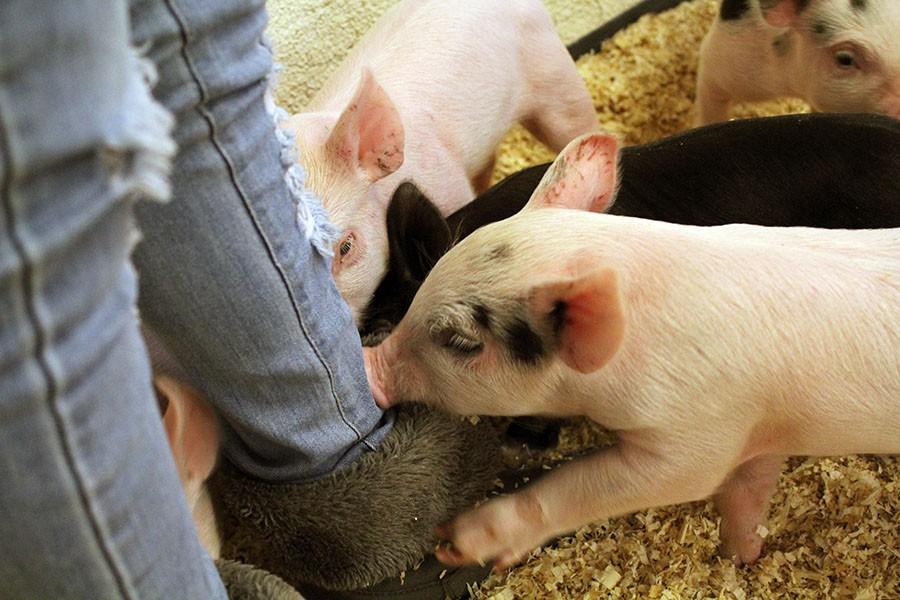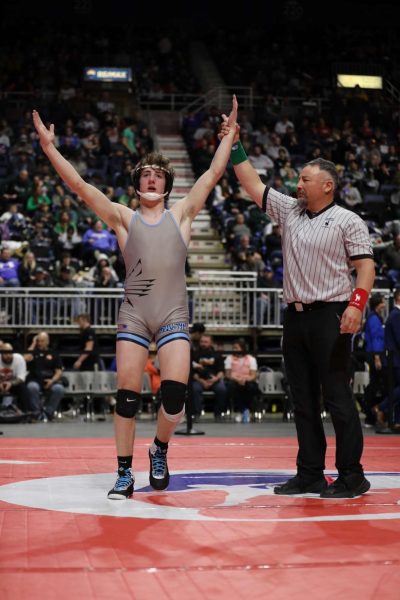East High Farm is Open for Business
East’s newest piglets chew at students shoes in the FFA lab. This is East’s second year raising pigs.
February 10, 2016
After struggling to realize the realities of owning animals, and suffering a major disappointment, the Frontier FFA chapter here at East High is back with a new set of pigs. For the last two school years, the FFA students have studied a pig’s reproductive process through housing live pigs in the school. This year, East is home to two sows, Oakley and Annie, and their piglets.
Oakley delivered nine healthy piglets on January 16, and Annie delivered her piglets on February 6. Annie gave birth to 15 piglets, but one was still-born.
This is an unique situation, and not one found at very many other high schools, but Mr. Joe Allen, FFA teacher, has found ways to continue this fun and educational tradition. “Oakley was donated and Annie was bought at the Laramie County Fair Sale,” says junior Hailey Rosinski, nursery attendant.
Junior Addy Rosner, the SOW Coordinator provided exact details on East High gaining these special visitors. “Annie was bought from LCCC and Oakley was donated to us from Brunette Enterprises,” she says. Oakley was the Reserve Champion Hog at the Laramie County Fair Sale before she was donated.
Oakley tried to deliver 11 piglets but two were stillborn. Of Oakley’s surviving nine piglets, two were belted, three white, two polka dot, one black, and one blue spot. “Mr. Allen is going to have all his classes do everything from notch their ears, clip their teeth, and clip their tails, so that it’s more hands on,” said Addy Rosner.
There are many things students learn with contributing to this project. Junior Hannah Jankovsky, Public Relations Manager, says some of the things they should be learning with the project is “about care for developing animals, basic veterinary practices, teamwork, developing schedules, making sure stuff gets told to everyone and written down, and making sure all the pigs are healthy.”
There are some positive and negative things that come into doing this project. “One of the biggest positives is it presents an opportunity for people who live in the city to get a more hands-on approach to it because it’s not something they’d normally be exposed to,” says Addie Rosner. She is also aware of the risks the come with owning farm animals. “Last year we lost Pinky, and it is pretty discouraging when they are stillborn,” added Rosner. “That’s pretty discouraging but at the same time it’s cool to see what does happen to the agricultural history.”
Last year, the loss of Pinky was devastating to many. “We’re not completely sure what happened to Pinky,” said Rosner. “But what we concluded from calling different vets is when she was in the theorem crate she got really constipated and that buildup caused a toxic level.”
She says the class is taking precautions to prevent it from happening again. “This year we’re very cautious of that. That’s why we took Oakley out of the theorem crate this year and (we’re) choosing a smaller pen with her piglets because we wanted to make sure she was up and moving with able to get up and trying to make sure she stays healthy.”
Experiencing the natural birth of the animals can be a chore for the FFA members. Hailey Rosinski and Addy Rosner tells us they were present the whole night Oakley delivered. “I stayed until 1 o’clock in the morning waiting for all these piglets to be born,” says Hailey. “It got pretty tiring because there were five minutes in between one and one would just come out, and there was one that was an hour and a half between one and everyone would rush around so it got pretty tiring.”
The responsibility of owning the pigs did not end with the birth. “People come in on the weekends and they have to make sure the piglets are okay and still alive because when Oakley lays down,” continues Hailey. “One could run underneath her and you have to make sure she’s fed and watered.”
The responsibilities go beyond just checking on the piglets. “We have to clean the pens,” says Addy. “We have taken time to walk them, and we’ve taken time out to go vaccinate them. It’s definitely more than just in class, but it’s nice that it’s everyone working.”
The lessons never end at the East High farm.









